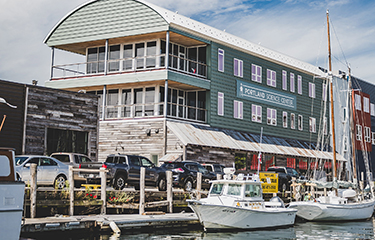A group of U.S. lawmakers want to establish ocean innovations clusters to help foster economic growth in the blue economy.
The ocean clusters will provide a space for public, private, and academic organizations in a set geographic area to collaborate in promoting economic growth and sustainability, according to U.S. Sen. Lisa Murkowski (R-Alaska), who introduced the legislation alongside U.S. Sen. Maria Cantwell (D-Washington).
“It really is a very collaborative approach to dealing with some of the challenges and opportunities we have in our coastal communities,” Murkowski told media in an 8 June call. “OCEAN ROI establish regional ocean clusters that facilitate levels of discussion and participation between different stakeholders.”
Senators Sheldon Whitehouse (D-Rhode Island), Patty Murray (D-Washington), Jeff Merkley (D-Oregon), Susan Collins (R-Maine), Angus King (I-Maine), and Dan Sullivan (R-Alaska) have signed onto the bill as cosponsors. U.S. Rep. Chellie Pingree (D-Maine) and Maria Elvira Salazar (R-Florida) introduced a version of the legislation in the House.
The bill would create grants for cluster operation and administration and one-time capital investments for physical infrastructure.
Murkowski said she first became familiar with the concept during a trip to Iceland in 2011, when she visited a large warehouse that hosted a variety of different organizations working on ocean-related projects.
“You had scientists in one room that were studying matters related to the health of the ocean, and then just down the hall from that you had somebody that was working on pharmaceuticals, utilizing fish skin to create bandages that would provide for healing more rapidly,” Murkowski recalled. “And then down the hall from that you had somebody that was making jewelry out of otoliths or fish skin – you had one person who had made lampshades out of cod skin, which were extraordinarily beautiful.”
Such clusters are present in many industries and have been adopted by seafood sectors in many countries, including China, Canada, and Wales.
The U.S. ocean clusters don’t need to be housed together in a facility like the one she visited in Iceland, Murkowski added. It just needs to foster that level of collaboration.
The senator pointed to a project run by the Alaska Fisheries Development Foundation as an example of what an ocean cluster could look like in the U.S. The Startup Accelerator, which was previously known as the Alaska Ocean Cluster and which was run by the Bering Sea Fishermen’s Association until earlier this year, has supported more than 16 start-ups get off the ground, tested new fishing technology, conducted fisheries-related research, and fostered a network of stakeholders.
The New England Ocean Cluster is another example. Established in partnership with the founder and chairman of the Iceland Ocean Cluster (IOC), the New England Ocean Cluster hosts a variety of ocean-based groups in its Portland, Maine, office.
“There has never been a better time to invest in blue economy companies that embrace people, planet, and profit as part of one mission,” New England Ocean Cluster Co-Founder and CEO Patrick Arnold said in supporting the legislation. “This is a great opportunity to accelerate the work being done in each region of the United States to create jobs in our coastal communities while introducing new products that fully utilize the renewable resources our oceans provide.”
The Iceland Ocean Cluster model has also spread to Seattle, Washington, in the establishment of the Pacific Northwest Ocean Cluster.
The Ocean Regional Opportunity and Innovation Act (Ocean ROI Act) would require the U.S. secretary of commerce to designate at least one ocean cluster in each NOAA Fisheries region – including the Great Lakes.
The legislation also would require at least one ocean cluster in Alaska, although Murkowski said the state could host multiple regional ocean clusters.
Photo courtesy of New England Ocean Cluster







